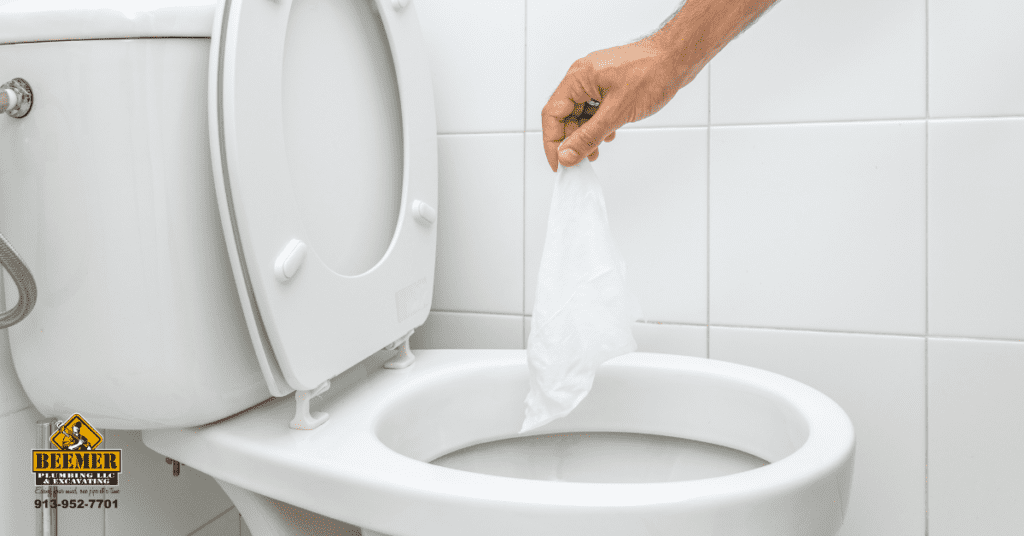Plumbing is one of the most essential systems in any home, yet it’s often misunderstood. Misconceptions about plumbing can lead to costly repairs, inefficiencies, and even safety hazards. To help you keep your plumbing system in top shape, Beemer Plumbing is tackling the top 10 plumbing myths that homeowners often believe.

Top 10 Plumbing Myths Debunked
Myth 1: Flushable Wipes Are Safe to Flush
Despite being marketed as “flushable,” these wipes can wreak havoc on your plumbing. Unlike toilet paper, which disintegrates quickly, flushable wipes can take much longer to break down, causing clogs in your pipes and sewer lines. Over time, these clogs can lead to backups and expensive repairs. The safest approach? Dispose of wipes in the trash, not the toilet.
Myth 2: Chemical Drain Cleaners Are Safe and Effective
When faced with a clogged drain, many homeowners turn to chemical drain cleaners. However, these products can cause more harm than good. The harsh chemicals can corrode your pipes over time, especially if used repeatedly. They’re also harmful to the environment and can be dangerous to handle. Instead, opt for safer methods like a plunger or a drain snake. For stubborn clogs, calling a professional plumber is the best solution.
Myth 3: A Leaky Faucet Is Not a Big Deal
A dripping faucet might seem like a minor inconvenience, but it can waste a significant amount of water. According to the U.S. Environmental Protection Agency (EPA), a single faucet dripping once per second can waste over 3,000 gallons of water annually. Fixing leaks promptly not only conserves water but also saves money on your utility bills.
Myth 4: All Plumbers Are the Same
Not all plumbers are created equal. Hiring an unlicensed or inexperienced plumber can lead to subpar work and additional costs down the line. Always choose a licensed, insured, and reputable professional, like Beemer Plumbing, to ensure your plumbing needs are met with expertise and reliability.
Myth 5: Running Water While Using the Garbage Disposal Prevents Clogs
While running water can help flush food particles through your garbage disposal, it’s not a foolproof method to prevent clogs. Certain items, like grease, fibrous vegetables (e.g., celery), and starchy foods (e.g., pasta and rice), can still accumulate and create blockages. To keep your disposal in good condition, avoid putting these items down the drain altogether.
Myth 6: Ice Cubes Sharpen Garbage Disposal Blades
Garbage disposals don’t actually have sharp blades—they use impellers to grind food into small particles. While ice cubes won’t sharpen anything, they can help clean the disposal by removing debris and buildup. Using ice occasionally is a good maintenance practice, but it’s not a miracle solution.
Myth 7: It’s Normal for Drains to Have Odors
Persistent odors coming from your drains are not normal and should be addressed. They could indicate problems such as a buildup of debris, mold, or even sewer gas leaks. Regular cleaning and maintenance can help eliminate odors, but if the smell persists, it’s time to call a professional to inspect your plumbing.
Myth 8: Plumbing Fixtures Require Little to No Maintenance
Many homeowners believe their plumbing fixtures are maintenance-free. In reality, regular care is essential to extend their lifespan and prevent issues. For example:
- Clean aerators on faucets to prevent clogs caused by mineral buildup.
- Check for signs of wear, such as rust or leaks, and address them promptly.
- Inspect seals and connections on fixtures to ensure they remain watertight.
Routine maintenance can save you money and headaches in the long run.
Myth 9: DIY Plumbing Repairs Are Just as Effective as Professional Work
While DIY repairs may seem like a cost-saving solution, they often result in more problems. Plumbing systems are complex, and improper repairs can lead to leaks, water damage, and code violations. Professionals have the training, tools, and expertise to handle issues correctly the first time, saving you time and money.
Myth 10: A Water Heater That’s Not Leaking Is Working Fine
Just because your water heater isn’t leaking doesn’t mean it’s in perfect condition. Over time, sediment can build up inside the tank, reducing efficiency and shortening its lifespan. Regular maintenance, such as flushing the tank and checking the anode rod, can help ensure your water heater operates efficiently and lasts longer.
Conclusion
Understanding the truth behind these common plumbing myths is crucial for maintaining a healthy and efficient plumbing system. By avoiding these misconceptions and following proper maintenance practices, you can save money, conserve water, and prevent costly repairs.
If you’re ever unsure about a plumbing issue, don’t hesitate to reach out to the professionals at Beemer Plumbing. With years of experience and a commitment to quality service, we’re here to ease your mind—one pipe at a time!